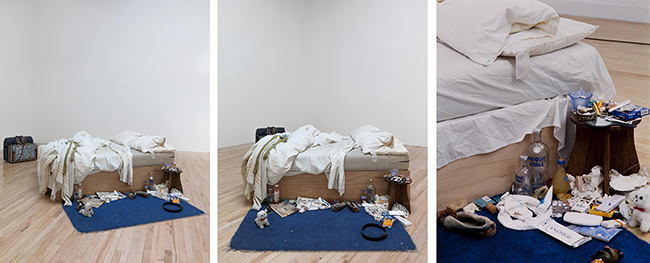
Tracey Emin, My Bed, 1998
Anima can help you identify if you have an anhedonic bias. This is important to know as one in five people will experience depression at some point in their life, and for many of them, this is a recurrent phenomenon [1]. Depression can also be accompanied by other mental illnesses, such as anxiety disorders or substance abuse. The condition has a huge impact on the quality of life and well-being of those affected by it. For example, depressed patients often display a reduced ability to experience positive emotions (anhedonia), which can lead to negative consequences. Anhedonic individuals tend to avoid pleasant situations because they expect them to end badly: they are unwilling to engage with potential sources of joy because they don’t believe these will last long enough for them to enjoy them fully. This behavior has been linked with poor outcomes among patients suffering from severe depression—they may become socially isolated and unable to maintain healthy relationships due to their lack of interest in pleasurable activities such as sexual encounters or social gatherings.
This may seem like a strange finding, but it can actually be explained quite simply: in the face of depression, it’s difficult to see positive things as good [2].
It’s important to note that this doesn’t mean depressed people are incapable of feeling happiness; rather, it means that their brains don’t register positive experiences as having any significant value or meaning. In other words, if you’re suffering from depression and start seeing everything through anhedonic glasses (or if someone close to you is), here are some signs that might help diagnose your situation:
If you have been diagnosed with depression and are finding it difficult to feel pleasure, then anhedonic bias is likely to be a problem for you. This can indicate that anhedonic bias is a promising target for new treatments of depression.
Positive emotions may be the key to overcoming depression.
Positive emotions like joy, contentment, interest, and pride are all critical parts of a life well-lived. In fact, positive emotions are essential for mental health. They help us feel better about ourselves and our lives; they help us cope with negative emotions; they can even help us solve problems and make decisions.
Positive emotions are not only beneficial in themselves but also because they lower the risk of depression by enhancing our ability to manage difficult situations that might otherwise have been overwhelming [3].
This is where anhedonia comes in: it means you’re less likely to experience or enjoy positive feelings such as happiness, pleasure, or excitement when you encounter them – even though it would seem perfectly reasonable for someone without anxiety disorders or other mental health conditions to react positively under similar circumstances!
The first thing you need to do is take a look at your own behavior. If you are experiencing changes in how you act or treat others, it could be a sign of depression. It isn’t always easy to see when we’re depressed because our brains can trick us into thinking that the things we are doing are normal. But if something feels different from before, it might be time for medical attention.
Depression is not a character flaw or something that comes about because of bad choices—it’s a severe mental health condition that affects an estimated 7% of people worldwide and causes symptoms like hopelessness, anxiety, and even thoughts of suicide. Depression doesn’t have one cause; instead, various factors, including genetics (your genes), environment (your life experiences), and brain chemistry, may trigger its onset. There are also effective treatments available that can help relieve symptoms so you can start feeling better again!
This is because they have not yet learned to cope with negative emotions.
However, it is not just the young who are vulnerable to anhedonic bias. Adults also experience this phenomenon when they are feeling stressed or depressed. In fact, research has shown that negative emotions can have a stronger impact on decision-making than positive ones do [4].
Depression is a severe mental health problem that can affect people of all ages. While depression may feel like something that’s happening to you, it’s actually not the result of anything you’ve done or don’t do. It’s also not a sign of personal weakness. In fact, most people who experience depression have difficulty recognizing their own symptoms at first because they feel “blah” rather than depressed all day long.
Depression can be treated with medication, psychotherapy (talk therapy), and lifestyle changes such as getting regular exercise or spending more time with friends and family members who support your recovery process. When left untreated over time, however, chronic depression often leads to other serious health problems, including heart disease and diabetes (two conditions linked to obesity).
Remember that anhedonia is a symptom of depression. If you’re feeling depressed, it’s important to get screened for anhedonia as well. This is especially true if you have other symptoms of depression, such as changes in appetite or sleep patterns, loss of interest in activities once enjoyed, feelings of worthlessness or guilt, or thoughts about death or suicide – it’s important to test yourself as soon as possible. Anima is a neuroscientific mental health test. Using eye-tracking technology, we can help you identify if you have traits of anhedonic bias. By catching depression symptoms early on, we can help you avoid developing a major depressive disorder.